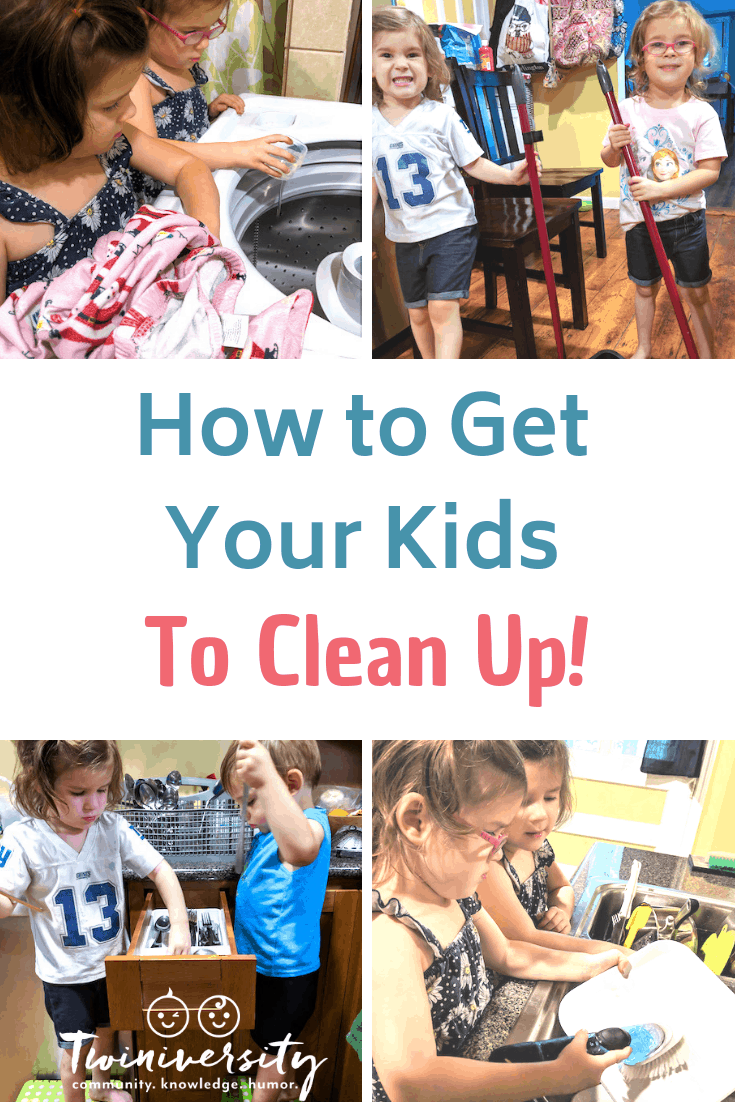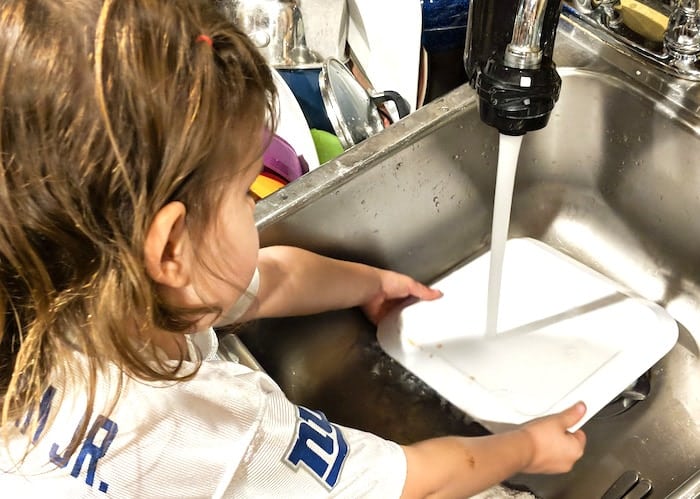Last updated on November 2nd, 2023 at 11:35 am
Chores: everyone does them, but most of us dread them. The word itself sounds boring, they’re time-consuming, and they often take us away from what we would rather be doing. It’s no wonder so many of us struggle to get our kids to do anything around the house, especially if they’re picking up on our resentment. Even if you enjoy them, it can be hard to get your kids to feel the same way!
However, many of these tasks can be modeled and taught in a way that kids can enjoy and someday, when they’re ready, they might just willingly do them with (and eventually for) us! Yes, for a while the work will fall to adults in a family, but it’s never too early to help your little ones cultivate a love for taking care of their home.
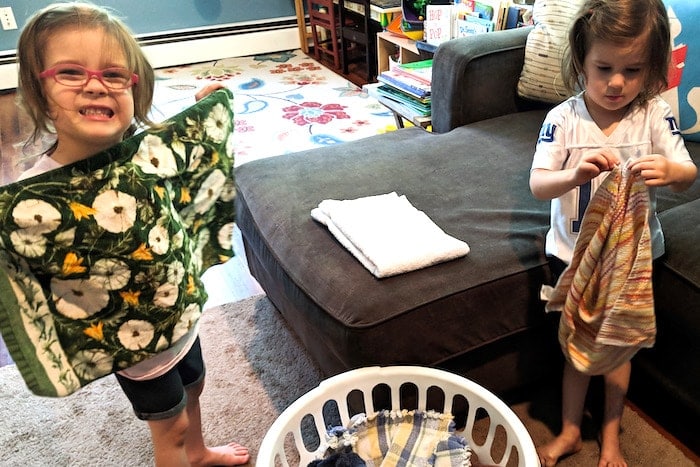
Flip The Script
The very first thing we can do to encourage our kids to help out is stop calling them chores or jobs or anything that sounds the opposite of fun. I know, sounds crazy, but hear me out! In our home, we refer to any of these jobs as Home Care Tasks. We’ve got self-care, we’ve got health care, why not home care? After all, that’s what these activities are: providing care for our home and the things we treasure.
The keys are to start with simple tasks they can mimic and make them fun. Rather than telling your twins they need to do their chores or jobs, have them join you in home care. Start young — even one-year-olds can wipe up a spot on the floor. If they’re older and already used to the work of chores, have talks about why we all help each other out; explain that it means more together time doing fun stuff, or more solo time pursuing their own interests. Make it clear that since we all live in our home and use our things, we all work together to care for them.
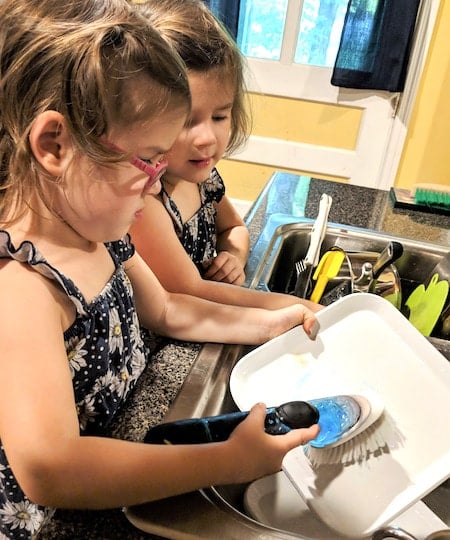
Try not to save all the work for when they are resting or otherwise preoccupied. Build your tasks into a daily, evening, or weekend routine from day one. It’s hard to see why anyone would willingly choose to clean up after themselves when it seems as though a magic fairy appears every night and leaves the place spotless. It may seem unrealistic in this busy day and age but carving out some time now can pay off in the long run. Kids love to be little helpers — take advantage of this!
- Hand your toddlers a damp rag and plastic plates to scrub
- Pick up two kiddie stools and have your preschoolers sort Tupperware or silverware.
- Invite them to help fold laundry; my four-year-olds love to do this and they fold towels almost better than I do.
- Pick up one of these kid-sized cleaning sets and encourage them to join you
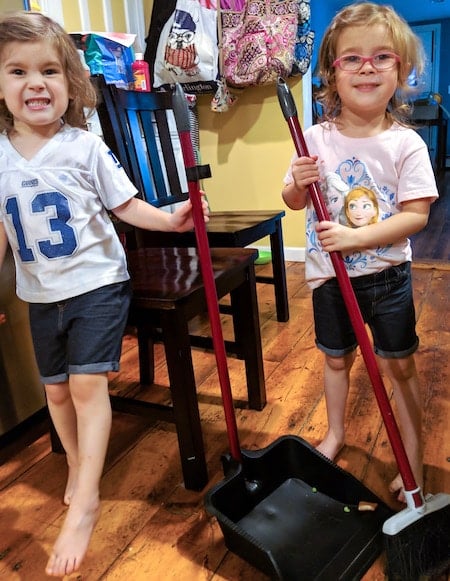
As always, try to have fun and keep it lighthearted! Encourage participation by adding some play into cleaning up:
- Put on some music and show them how to rock out while you clean
- Make it a game where everyone gets a point for every toy they toss into the bin
- Assign challenges such as finding everything blue or shaped like a circle and have them race each other to get it done
- You race them! Set a timer and challenge them to beat your time (of course, you conveniently come in last place…)
- Sometimes, when it’s convenient (and definitely not all the time) offer a fun incentive. Even adults will work harder when we know we get to have ice cream after!
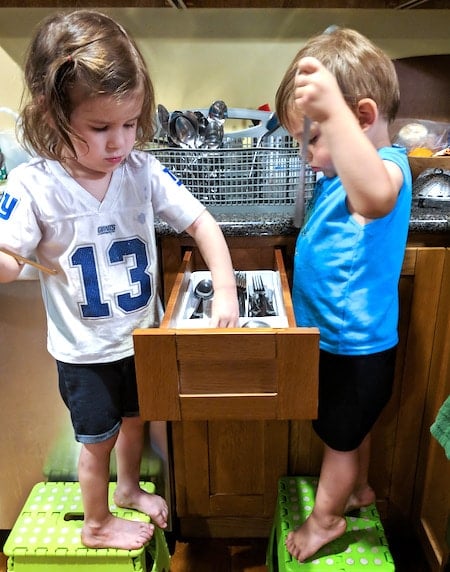
Set Them Up for Success and Stay Positive
Twins really are just tiny tornadoes from the time they can crawl. While it’s mostly fun and games, the reality is that much of the picking up is left to parents until kids are around 5 or 6 years old. While they’re capable at a younger age, it’s often just a battle and we end up doing it anyway.
Save yourself the stress by limiting the amount of toys, clothes, games, and stuffed animals that they have access to. KonMari your home, go minimalist or just store a bunch of stuff in the basement, whatever you can. Unless you’re comfortable living with the mess or feel like fighting or making demands all the time, try to limit mess-making opportunities.
You will likely have to request help many times for many years but there are ways to encourage cooperation that don’t involve threats or punishment. How many times we do we say things like: “If you don’t pick up your toys then we can’t go to the park!” only to see our twinnies either meltdown on the spot or go on without a care until it’s time to follow through with the threat and then no one is happy – and you still have to clean the mess anyway!
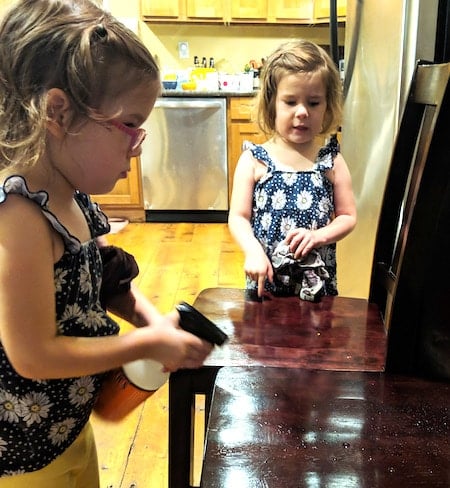
Instead, Try Rephrasing in a Positive Way:
“When we finish picking up your blocks, we can go to the playground.” or
“When lunch clean up is done, then we can play. It will go faster if you help me!”
Staying positive also helps reinforce that while household tasks may not be the most fun, working together means more fun together. Older twins may need more incentive in the form of chore reward charts or allowance, but staying positive can make all the difference in fighting the battles.
Know Their Limits and Trust Them to Try
That said, sometimes your twins will just shove things out of sight or have a water fight while they were supposed to be doing the dishes. While frustrating, it’s all a part of the process. Keep modeling and encouraging them and trust that soon they’ll see the big picture. Also, be sure your requests are age appropriate and supervised to help avoid frustration on both ends.
When they make a mess or refuse to help, try to keep your cool. Have them help you re-do it or remind them that these tasks come first, then fun. Alternatively, if you can live with “their way”, try just leaving it. Not only will it come across as far more encouraging to them but they will eventually figure out that there’s a reason why we do things the way they do – when their favorite cups are still dirty or they can’t find their treasured toys. Experience is always the best teacher.
Try not to lose sight of the goal: a clean house is wonderful, but connection with our kids and passing on these life lessons should be the focus as often as possible. Have fun with the work while passing on the values that truly matter. There are many ways that kids of all ages can help us out with home care if we stress less about the end product and focus more on the process!
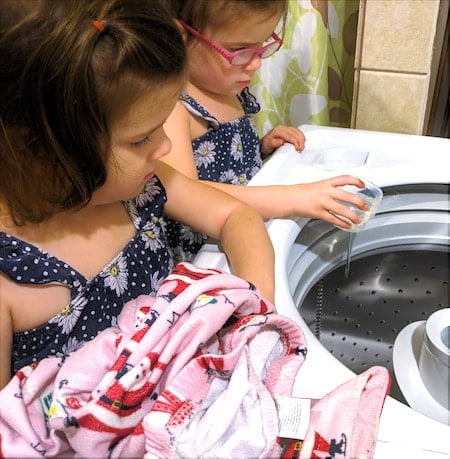
2-5 years
- Toy pick up – learn how to match and sort, practice tossing and seeking skills, learn about size and colors
- Laundry – sorting by color, feeling textures, pouring, pushing buttons, helping fold
- Wiping down surfaces – learn about wet, damp, and dry, practice spraying and wiping
- Dishes – help with washing and drying, sorting silverware, stacking plastic bowls and cups
- Bedroom care – changing bedding can become a silly game, practice sorting by putting clothes in the right place (clean in the drawers, dirty in the hamper)
5-10 years old
All of the above, plus:
- Setting and clearing the table – learn about place settings, pouring beverages, cleaning plates properly before washing
- Laundry – putting things neatly away, working the machines, fractions, and timing
- Sweep and mop up after a meal and dusting – learn the mechanics of brooms and mops, go on a dirt hunt
- Dishes – explore temperature of water, scrubbing, play the game of working out the puzzle of an overflowing dishwasher or drying rack
- Feeding and caring for animals – feeding time can be about fractions, learn the basics of hygiene, a time for some play and exercise
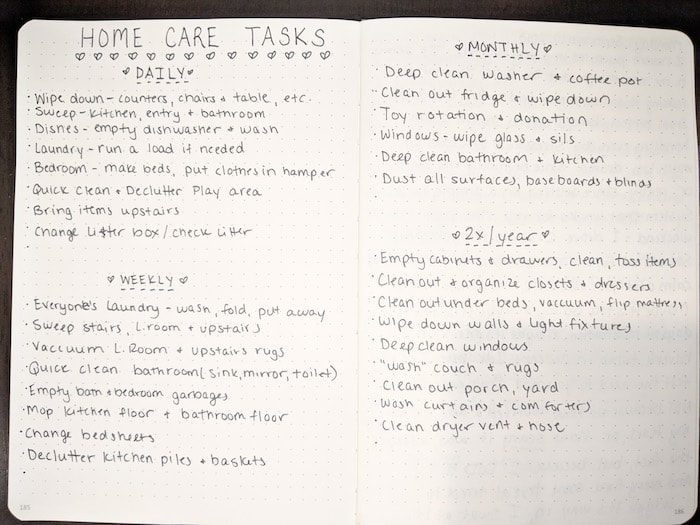
You know your children best, so when giving out tasks for older kids try to assign what they’re good at or interested in. Let one take the dog out while the other helps you clear the table, when it’s his or her preferred time to chat. It ultimately comes down to whatever works for your family. Think about setting realistic goals with positive incentives: screen time or time with friends after your part of the home care is done.
Above all, try to remember that the days are long (and messy) but the years are short. We only have a little time to help set lifelong habits for good home care. Why not do it through connection and positive, playful experiences as often as we can? This is not to say it won’t still be a struggle, but let your twins see you taking pride in your home, have some fun, and encourage them to do the same!
Top 5 Tips for Getting Kids Involved in Home Care Tasks:
- Focus on the fact that home care is important for the entire family and working together can mean more fun time
- Invite them to participate and make these tasks a fun part of your daily routine rather than hurrying through while stressed out
- Set them up for success, limit their opportunities to make huge messes and, when they do, encourage help cleaning up by staying positive rather than threatening
- Let them try: pick up a small broom and dustpan or hand them a spray bottle and see what happens
- Trust the process and trust them! Stick with age-appropriate tasks and try to infuse fun and learning any way you can

Maigen Beaulieu is a former Child-Care Provider and freelance writer living in Upstate New York with her husband, 7-year-old identical twin girls, one lazy cat (Willow), and one wild Yorkie (Ella). As a way to cope with anxiety during her twin pregnancy, she began blogging about her journey and discovered a love of writing for, and connecting with, other parents of multiples. While her blog was put to rest years ago (hello, working mom of toddler twins with zero time to write), Maigen is thrilled to join Twiniversity and help other families navigate the journey of parenting multiples. When she isn’t writing about the magic and madness of twins, she can be found reading historical fiction, researching her family history as an amateur genealogist, or sewing cute jackets for her dog. She can be reached via her blog Life and Love. Multiplied, on Twitter and Instagram.
Related Articles
- The 5 Dollar Plan for Kids Chores
- Age Appropriate Chores for Kids 2 to 14 Years Old
- Keeping Your House Clean Without A Cleaning Lady
